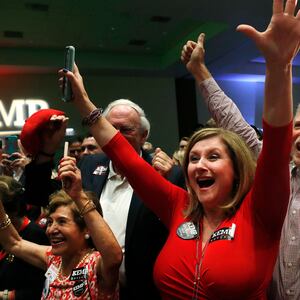Monday morning, before the sunrise cleared the Potomac, President Donald Trump resumed his abhorrent, vicious verbal attacks on House Oversight Committee chair Elijah Cummings. Derisively calling the 13-term congressman “King Elijah,” Trump erroneously Tweeted that Baltimore “has the worst Crime Statistics in the Nation” before turning his rhetorical fire on another black Democrat—the Rev. Al Sharpton.
A one-time ally during Trump’s years as a tax-cheating real-estate developer and casino owner, the civil rights leader and MSNBC host was dismissed by the president as a “conman”on Monday.
Certainly there was no small irony in Trump’s use of “king” or “con,” but this is a man without borders when it comes it irony or decency. His viciousness knows no bounds. This time, however, he may have just picked the wrong fight. Sharpton, like Cummings, remains a commanding force in Democratic politics.
Trump might be miffed with Sharpton now, but there was a time when Trump relished the company of black celebrities. The former reality television star once surrounded himself with people like music moguls Russell Simmons and Sean “Diddy” Combs, boxing promoter Don King, and heavyweight champ Mike Tyson.
All the while, he believed the streets and avenues “the blacks,” as he often called them, hailed from were deplorable slums where no human being would choose to live. Even then—as he cozied up to Sharpton and others at fancy receptions and galas—there were a litany of examples of his racial animus and bigotry.
Trump is, and always has been, a creature of opportunity. And now, it seems, he believes spewing hateful and divisive rhetoric in an effort to marginalize a political opponent will protect him from the inevitable—the end of his presidency. He isn’t backing up. He’s doubling down.
There are those who see his latest string of invective and political fisticuffs as brilliant political strategy, a parlor trick aimed at shoring up his base. Others call it a meaningless distraction that should be ignored. But, make no mistake, we are witnessing the wholesale abdication of our nation’s moral authority—at home and abroad. Far from a petty disruption, the president’s vile animus for people of color—for the American populace, writ large—informs a myriad of disastrous and dangerous public policy decisions.
Trump, buoyed by the silence of his Republican countrymen, sees no significant check on his behavior. He has been allowed to run roughshod over the GOP caucus, because Republicans lawmakers—who either stand with him in those repugnant beliefs or are fearful of retribution from GOP base supporters—are largely numb and mum in the face of his failed leadership. For many of them, he is exactly the leader they have been waiting for—one who will wage a daily fight in the name of white tribalism and dependably take aim at racial and religious minorities and other historically disenfranchised people.
They heartily defend the indefensible, heaping praise upon a man who refers to whole cities like Baltimore, Atlanta, Chicago, Los Angeles, and even New York—his hometown—as “infested” with rodents and violent crime. For them, advancing white supremacy and xenophobic nationalism is the highest form of patriotism. Our rich and diverse tapestry weakens and fails us, in their telling.
Ahead of the 2020 presidential election, Trump wants us to believe that he is spoiling for the fight, that the country stands with him as he spews daily monstrosities that cheapen our values. To the contrary, although they may be vocal, there is no evidence that Trump’s base support is growing or becoming more galvanized. In fact, there is every indication that white, college-educated suburbanites—the softest belly of his support—are pulling away, increasingly sickened by his racist diatribes. Trump’s economic agenda—or lack thereof—won’t save him.
Working class white voters in the upper Midwest, the region that secured his 2016 win, saw their taxes go up and many of the manufacturing plants Trump promised to keep open were shuttered. Now, he’s cutting food stamps—the very programs that keep food on the table for those who need it most in red and blue states alike—and upending the Affordable Care Act in ways that threatens the healthcare of over 20 million Americans.
Trump has been explicit in how he sees our country—a nation he believes was built on the heft and might of white men who are supreme in their ability to govern. He is attempting to leverage the politics of white resentment because, frankly, that’s all he’s got. It takes coalitions to win elections, and Trump is busy sequestering himself on an isle of white supremacy.
Trump should not only be mindful of how his virulent racism is being received among suburbanites—midwestern, coastal, and otherwise. He should remember Sharpton’s role in the 2008 and 2012 election cycles—and the record-setting African American turnout he helped generate. (The 2004 presidential election that Sharpton ran in, with the counsel of Roger Stone, is another story.)
Trump should be worried that mayors across the country—men and women who grapple with serious issues and confront them with meaningful solutions every day—will respond to his vitriol by investing the full weight of their political machines toward defeating him at the ballot box. Trump’s narrow win over Hilary Clinton in 2016—due wholly to his 80,000 vote margin across three states—won’t hold if black and brown voters show up in 2020. In fact, he’ll have to fight in states like Georgia and Colorado—where Republicans could once count on easy wins.
If Trump is spoiling for a fight, well, in the words of the great Kendrick Lamar: You can get it. And that, Mr. President, would be poetic justice indeed.







